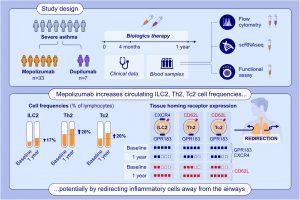Biological therapies have transformed the treatment landscape for severe asthma, offering relief to many patients where standard treatments fall short. However, new research from suggests that these drugs may not fully eliminate the immune cells that drive inflammation, raising questions about the long-term management of the disease (Figure 1).
In a new study, researchers analysed blood samples from patients undergoing biologic treatment and discovered a surprising pattern: rather than being reduced, some inflammatory immune cells increased during therapy.
Biologic drugs such as mepolizumab and dupilumab target specific molecules involved in asthma-related inflammation, typically cytokines like IL-5 or IL-4/IL-13. These treatments have shown strong clinical results in controlling airway symptoms and reducing hospitalisations. Yet, their exact effects on the immune cell populations involved in asthma have remained largely unexplored.
To investigate, the research team studied blood samples from 40 patients, analysing their immune profiles before and during treatment using advanced tools such as flow cytometry and single-cell RNA sequencing. They found that certain immune cell types, including high inflammatory potential molecules, increased during therapy.
One potential explanation for this paradox is that while biologics block specific inflammatory pathways, they may not eliminate the immune cells responsible for producing those inflammatory signals. As a result, symptoms are controlled, but the immune system remains primed for inflammation, which could return if treatment is paused or stopped.
Biologics are still relatively new in asthma care, with less than a decade of widespread clinical use. As such, little is known about their long-term immunological impact. The next phase of the research will involve studying patients who have been on biologic therapy for extended periods and analysing lung tissue samples to observe how immune cells behave in the airways themselves.
Journal article: Wirth, L., et al., 2025. High‐Dimensional Analysis of Type 2 Lymphocyte Dynamics During Mepolizumab or Dupilumab Treatment in Severe Asthma. Allergy.
Summary by Stefan Botha











